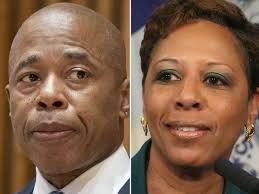Both parties reach deal on record $101B budget weeks –Adams, Council

Mayor Eric Adams and the City Council has reached a deal Friday on a $101.1 billion budget for the upcoming fiscal year, city officials announced Friday.
The deal came after multiple weeks of negotiations between administration officials and council leaders, and comes three weeks ahead of the deadline to finalize the city’s financial plan.
It includes both a record amount of total city reserves, at $8.3 billion, as well as growing spending gaps in coming fiscal years, reaching $4 billion on average through 2026.
Council leaders said they secured increased spending on sanitation, housing assistance, social services, property tax breaks and for cultural institutions.
“That is an unprecedented outcome for this council,” said Council Speaker Adrienne Adams at a news conference Friday afternoon. “We know that in order for our communities to be safe, and for our city to be stronger, we have to invest in New Yorkers.”
The final spending plan includes some concessions from the mayor, such as excluding additional money for nearly 500 more correction officers, a major sticking point of the council in recent weeks even as the mayor sought to beef up personnel at the scandal-plagued Rikers Island jail complex.
The budget for the police department is flat, compared with last year’s budget, Mayor Adams said, and he said his administration would emphasize trying to tamp down on chronic overspending on overtime.
Mayor Adams, appearing in a long sleeve guayabera shirt instead of a suit and tie, said he wanted the budget to reflect a fresh approach to city management.
“If we stay traditional, we’re going to do traditional things,” he said. “And traditional things didn’t help us.”
The budget includes a $150 property tax rebate aimed at reducing financial burden on small property owners, in the hopes that those supports will in turn reduce pressure on renters. The city estimates that 600,000 residents — in households with a combined income of less than $500,000 — will be eligible for the one-time rebate, which will cost the city about $90 million.
Adams framed the rebate as lending a hand to renters, by helping ease financial burdens on middle-class owners of multi-family homes.
“I am not going to allow anybody to tell us were not going to be there on behalf of renters,” Adams said.
It also includes expanded funding for housing vouchers and for a mentorship program of people who age out of the foster care system, as well as $10 million to fund child care vouchers for families of undocumented children.
The city’s child care voucher comes after the state excluded a similar program from its own budget, and could cover 500 to 700 city children under the age of 5.
Adams also said that the budget made sanitation a priority, with funding for 1,000 rat-proof trash containers and increasing litter basket service above pre-pandemic levels across the boroughs.
“New Yorkers, we heard you,” Adams said. “The streets are too darn dirty.”
City schools are still facing hundreds of millions of dollars in cuts, in part due to falling enrollment.
City cultural organizations are getting an additional $40 million in funding, out of a proposed $100 million package.
In an emailed statement, City Comptroller Brad Lander said he opposed the education cuts, and criticized the budget for not doing more to ease the city’s housing crisis.
“This budget fails to meet the needs of this urgent moment with the level of capital funding needed for affordable, supportive and public housing,” Lander said.
The Citizens Budget Commission said that the city should have put more money into reserves, noting that the outyear budget gaps have increased from earlier budget proposals. The budget deal includes an additional $750 million for the city’s rainy day fund, falling short of the extra $1.5 billion that the commission called for.
“While the budget funds priorities and takes some steps to save for a future recession and stabilize the budget, it misses the opportunity to make a substantially higher” deposits to the city’s rainy day fund, commission president Andrew Rein said in a statement.



